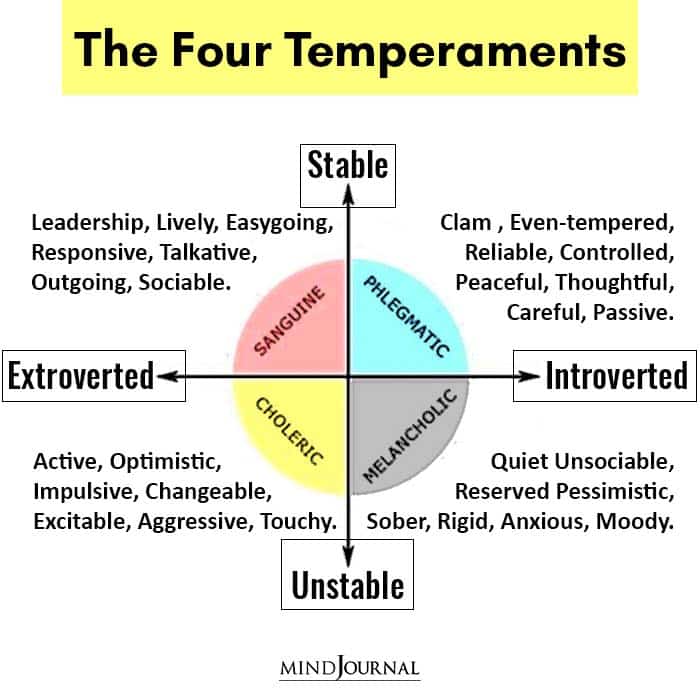Have you ever come across someone who always seems calm, composed, and unfazed by the chaos around them? They possess the unique phlegmatic temperament that sets them apart from the rest. Let’s explore what is phlegmatic personality and how to deal with phlegmatic personality.
Today, we will delve into the intricacies of the phlegmatic personality type, explore its defining traits, and discover effective ways to navigate and foster harmonious relationships with individuals who possess this temperament.
What is Phlegmatic Personality?
The phlegmatic personality is one of the four traditional personality types that were originally proposed by the ancient Greek physician Hippocrates, and later refined by other psychologists and personality theorists. It is characterized by a calm, easygoing, composed and balanced disposition.
These four personality types are often referred to as the “Four Temperaments,” and they are believed to be based on the balance of bodily fluids, or “humors,” in a person’s body, according to the ancient medical theory.

Individuals with a phlegmatic personality type tend to exhibit a stable and predictable emotional state, often appearing relaxed and undisturbed by external stimuli. They possess a natural inclination towards peace, tranquility, and harmony in their interactions with others.
Phlegmatic individuals tend to be introverted and reserved, often preferring smaller social settings or solitude. They are thoughtful decision-makers who weigh their options carefully and remain emotionally stable, rarely experiencing extreme mood swings.
Known for their patience and tolerance, they handle delays and inconveniences with equanimity. Phlegmatics are dependable and reliable, consistently fulfilling their commitments.
They also tend to avoid conflict and seek peaceful resolutions in interpersonal situations. While the Four Temperaments are somewhat outdated in modern psychology, they still hold cultural and historical significance in describing certain personality traits.
Related: What Is Sanguine Personality? 10 Signs You’re The Human Version Of Sunshine
Phlegmatic Personality Traits
Now that we know what is phlegmatic personality, let’s explore some of their traits. Here are some of the most common phlegmatic Personality Traits that you should know about –
1. Calm and Composed Demeanor
People with a phlegmatic personality have a remarkable ability to remain calm and composed, even in the face of challenging and stressful situations. They exhibit a stable emotional state, which helps them maintain a balanced outlook on life.
2. Easygoing and Flexible Nature
Phlegmatics tend to possess a laid-back and adaptable nature. They are often open to new experiences, flexible in their approach to change, and willing to accommodate the needs and preferences of others.
3. Patient and Tolerant Attitude
A phlegmatic individual is known for their patience and tolerance, making them excellent listeners and mediators. They approach conflicts with a diplomatic mindset, seeking resolutions that satisfy all parties involved.
4. Empathy and Sensitivity
Phlegmatics possess a heightened sense of empathy and sensitivity towards others’ emotions.
They have an innate ability to understand and relate to the feelings and experiences of those around them, often offering support and reassurance. This is one of the most important phlegmatic personality traits.
5. Strong Interpersonal Skills
Individuals with a phlegmatic temperament excel in building and maintaining relationships. They are excellent team players, valuing cooperation, collaboration, and harmony within social dynamics.
Their ability to listen attentively and provide emotional support makes them trustworthy and reliable friends.
6. Reluctance to Take Initiative
Phlegmatic individuals may be perceived as reserved or hesitant when it comes to taking the lead or making decisions. They prefer to observe and analyze situations before committing to a course of action, ensuring a well-thought-out approach.
Related: Body Shape Personality Test: How Your Body Reveals Your Personality Type?
How To Deal With Phlegmatic Personality Type
Understanding and adapting to the needs of phlegmatic individuals can contribute to stronger, more harmonious relationships. Here are some effective strategies for dealing with phlegmatic personalities, once you know what is phlegmatic personality –
1. Cultivate Patience and Understanding
Recognize that phlegmatic individuals may take their time to process information and make decisions. Avoid rushing or pressuring them, as it may cause unnecessary stress.
Instead, practice patience and offer them the space they need to reflect and respond in their own time.
2. Provide a Supportive Environment
Create a safe and non-threatening environment where phlegmatic individuals feel comfortable expressing their thoughts and emotions. Encourage open communication and active listening, allowing them to share their perspective without fear of judgment or criticism.
3. Respect Their Need for Solitude
Phlegmatics often require periods of solitude to recharge and reflect. Understand and respect their need for personal space and time alone.
Avoid overwhelming them with constant social engagements and give them the freedom to engage in activities that help them recharge their energy levels.
4. Emphasize Collaboration and Consensus
When working in a team or group setting, foster an atmosphere of collaboration and consensus-building. Phlegmatics thrive in environments where everyone’s opinions are valued and decisions are made through mutual agreement.
Encourage open dialogue and seek compromises that accommodate everyone’s needs.
5. Express Appreciation and Affection
Individuals with a phlegmatic temperament value genuine appreciation and affection. Express your gratitude for their calm demeanor, patience, and support. Small gestures of kindness and recognition can go a long way in nurturing your relationship with them.
6. Be Mindful of Their Sensitivity
Due to their heightened sensitivity, phlegmatic individuals may be more prone to feeling overwhelmed by conflict or criticism.
When engaging in discussions or offering feedback, choose your words carefully and adopt a constructive and gentle approach. Focus on creating a supportive and nurturing atmosphere.
That’s all about how to deal with phlegmatic personality.
Related: How Shallow Is Too Shallow? Understanding Shallow Personality Meaning, Signs And Causes
Takeaway
Knowing what is phlegmatic personality and its unique traits provide valuable insights into fostering meaningful and harmonious relationships. By cultivating patience, offering support, and creating an environment that values cooperation and empathy, we can harness the strengths of phlegmatic individuals and build enriching connections.
Embracing the diversity of personalities allows us to create a world where everyone’s unique qualities are appreciated and celebrated.
Frequently Asked Questions (FAQs):
Is phlegmatic a good thing?
Phlegmatic traits have advantages like calmness and stability, but may hinder assertiveness and emotional expression, depending on the context.
How does a phlegmatic person behave?
A phlegmatic person is typically calm, introverted, patient, and avoids conflicts, but may struggle with assertiveness and emotional expression.
What is a phlegmatic attitude?
A phlegmatic attitude is characterized by calmness, introversion, patience, and avoidance of conflicts, often displaying emotional stability and thoughtfulness.










Leave a Reply